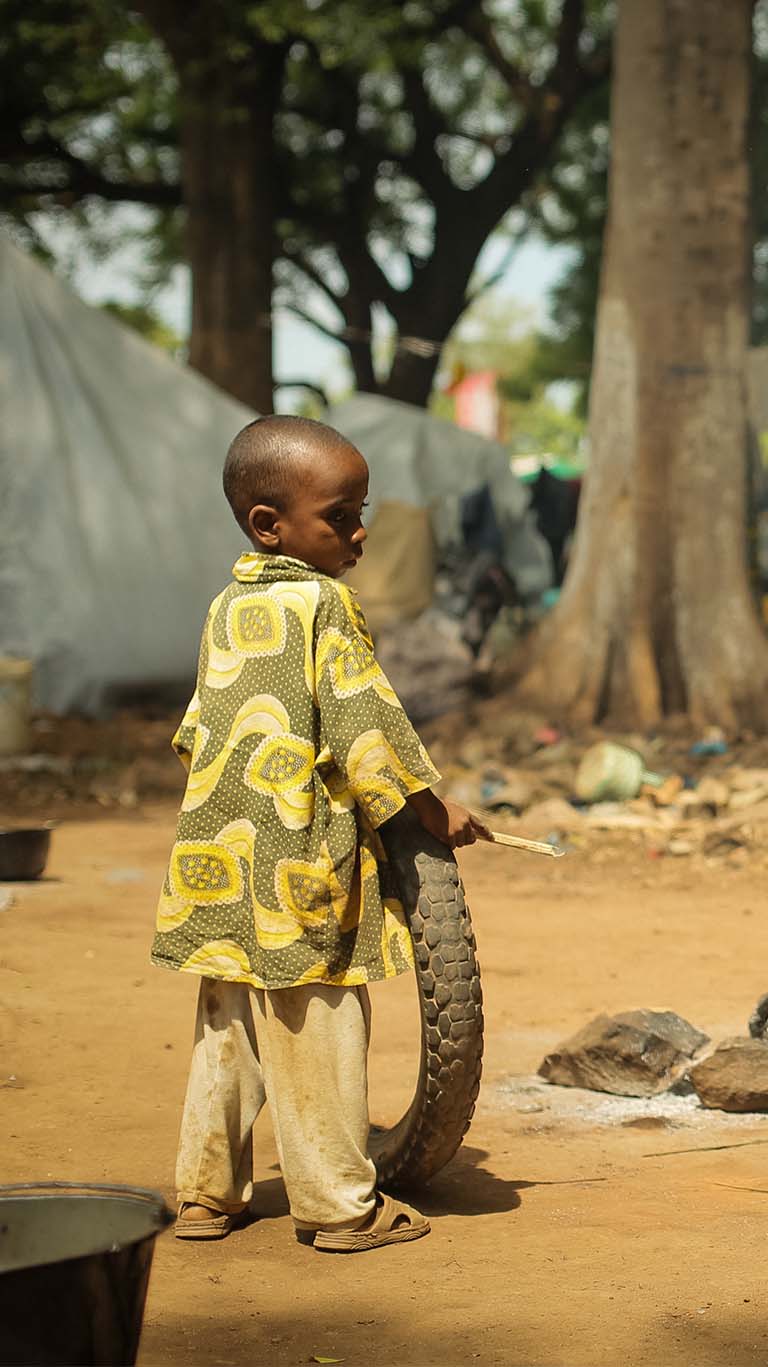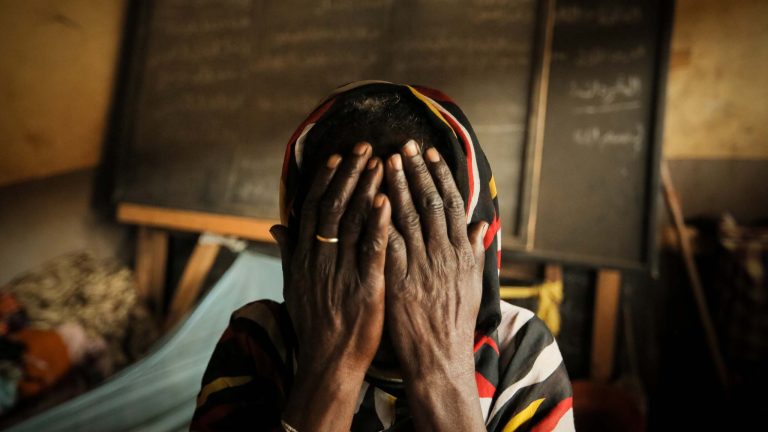Since 2013, Médecins du Monde supports the health system of the country to respond to the health emergency. This is done through the restarting of healthcare activities and the availability of the minimum package of activities (a set of activities that allow for the learning of new interventions without negatively affecting the organisation of the work already in place).

MDM WORLDWIDE
Central African Republic
© Sébastien Duijndam
- Home Page
- Central African Republic
3,1
million
people in need of humanitarian assistance.
691,791
displaced people.
396
security incident affected humanitarian workers in 2021.
Médecins du Monde’s emergency response includes a range of humanitarian assistance programmes. Find out more below about our work and missions in Central African Republic.
THE HUMANITARIAN SITUATION IN CENTRAL AFRICAN REPUBLIC
The Central African Republic (CAR) is affected by numerous armed conflicts resulting in a grave humanitarian crisis as well as an increase in human rights and international humanitarian law violations.
As danger is lingering over the civil populations, we must intervene in Central African Republic.
-
CIVILIANS ARE TRAPPED IN THE MIDDLE OF ARMED CONFLICTS
In Central African Republic (CAR) the population remains severely affected by the confrontations between armed groups, in the capital of the country Bangui or in provinces.
Despite the decrease in confrontations, the Political Agreement for Peace and Reconciliation (Khartoum Accord) signed in February 2019 did not keep all its promises. Violence continued, causing human losses, suffering and displacement of populations.
One Central African out of four is either displaced inside the country or in a neighbouring country. Waves of displaced people returning to the country have considerably slowed down. The Central African Republic has never seen that many people in such humanitarian distress.
This increase is the direct consequence of the collapse of the country’s economy, the coming of new areas of violent conflicts, the rise of food insecurity and the Covid-19 pandemic.
-
A HEALTHCARE SYSTEM IN DANGER
When they are not abandoned by the medical staff, healthcare facilities are targeted and attacked by armed groups.
The healthcare services are not enough to meet the needs of the population, caused by the rise of injured people, people suffering from mental illnesses or survivors of rape, as well as the incidence of transmitted diseases and risks of epidemics.
-
AN ALARMING NUTRITIONAL SITUATION
The nutritional status of the country is also alarming. The Food Security Phase Classification reported in October of 2021 that 2.05 million people, that being 42% of the population, are experiencing high acute food insecurity, of whom 619,565 people are in situations of emergency.
According to these estimates, more than 60,000 children aged under 5 need urgent care. The unstable security context is causing the closing of markets and strongly impacts resources and the livelihood of the populations, especially those in rural areas and those located in the most affected areas.
-
AN UNSTABLE POLITICAL ENVIRONMENT
Despite the apparent progress, the Central African Republic has never really moved on from being in a crisis to rebuilding and reconciling.
The government struggles to expand its authority beyond Bangui, thereby never really reaching the populations outside of the capital.
Projects for development are often hindered by safety issues and have not provided the youth with enough employment.
On 17 December 2020, the presidential and legislative electoral process has created the Coalition of Patriots for Change (CPC), a rebel coalition made up of six armed groups formerly enemies.
The aim of this union was to make illegitimate and even prevent presidential elections from happening. Although the first ballot was not cancelled, part of the population was not able to vote. This new climate led to an increase in security incidents and further deteriorated the situation in the country.
-
ENVIRONMENTAL HAZARDS ARE INCREASING
The Central African Republic is a victim of climate change and natural disasters are recurrent; 30,000 disaster victims were recorded as of 26 September 2021.
Environmental hazards such as fires and floodings and low precipitation levels are more and more frequent, and they are disturbing the livelihoods of the populations. Rated second to last on the ND-Gain scale, the Central African Republic is struggling to face climate change when future trends are forecasted to increase such climate phenomena. Disaster victims are vulnerable to diseases and epidemics caused by ingesting or being in contact with unsafe water.
Epidemics regularly hit the central African territory and the basic services are too weak to allow for a quick response.
-
INCREASE IN GENDER BASED VIOLENCE
Gender-based violence (GBV) is a scourge: one incident is reported every hour through the alert system, which covers only 42% of the country.
Humanitarian players have reported an increase of violence against girls and women after the restrictions caused by Covid-19.
It is estimated that 1.2 million people will be victims of GBV in 2022. Women and girls are disproportionally affected – representing 95% of GBV survivors in CAR – and minors account for 21% of GBV cases.

© Sebastien Duijndam
OUR HUMANITARIAN WORK IN CENTRAL AFRICAN REPUBLIC
Médecins du Monde is setting up a humanitarian mission in Central African Republic to respond to health, social and political emergencies.
Our teams have notably provided medical assistance to the most vulnerable populations.
ENSURING ACCESS TO HEALTHCARE
-
SEXUAL AND REPRODUCTIVE HEALTH IS A PRIORITY
Special attention was paid to the sexual and reproductive health needs (SRH) through pre and postnatal consultations, family planning, gynaecological consultations and referrals of obstetric emergencies.
Our teams set up healthcare services for different sectors such as medical or psychosocial, for survivors of gender-based violence, and set in motion community mobilisation surrounding issues like SHR and mental health.
Médecins du Monde gained substantial experience and established good cooperation with Central African authorities as well as with civil society, as the organisation has been present for many years in Central African Republic to help set up a range of humanitarian projects.
-
PAYING SPECIAL ATTENTION TO CARE FOR CHILDREN AND TO SCREENINGS
Our organisation started operating in provinces for the first time in 2020, despite some tense security conditions.
Today, we support the hospital in Bouca and four other primary health structures in the subprefecture of Bouca. We treat children suffering from malaria, respiratory infections or diarrhoea with curative consultations.
Malnutrition is diagnosed and children are vaccinated.
Our organisation also provides essential medicine and transfers life-threatening emergencies to referral structures.
Médecins du Monde is currently extending its support to the Bouca health district by targeting a new zone (Bouca/Marali) to provide support to four additional health trainings in order to reach 62% of the district’s total population, as Bouca and Marali are where most of the area’s population live. The project also includes more support for the health district in terms of monitoring, assessing, mobilising and coordinating key players for the operational action plan in the district and reinforce IPC measures (infection, prevention and control) in health trainings.
-
RAPID RESPONSE MECANISM AND MOBILE CLINICS PROGRAMMES
In the context of the medical assistance provided in November 2019, Médecins du Monde has set up a new medical team for rapid response operating in a mobile clinic for the Rapid Response Mechanism (RRM) in coordination with the Cluster Santé and the central African Ministry of Health. Since the beginning of the operation, the team has already helped with displaced people in Bangui after major floods in Abba (North-West of the country) following the displacements of populations, then in Damara to respond to an epidemic of measles.
In 2021, the team has also worked in Dekoa, Kouango, Bossembélé and in the Bossangoa-Bézambé zone in the wake of violence and displacements of populations due to the electoral and post electoral crisis. This mobile clinic operates after crises (displacement of populations, epidemics) to revitalise access to care for the populations affected by it.
The mobile clinic team is currently on an exploratory mission in Ippy, where 2,500 families have found refuge after intense confrontations in the area. Furthermore, the mobile clinic team was trained by the WHO on activities to deal with Covid-19, which allowed them to set up prevention activities when they were going on outreach missions.
The mobile clinic combines an immediate response to emergencies to revitalising the local healthcare system affected by these events. The deployments of our teams include a complete pack of services: primary healthcare, sexual and reproductive care, including cases of gender-based violence (medical care and psycho-social support), nutrition (SAM), psychosocial support and mental health awareness-raising sessions amongst the communities.
Since 2021, the mobile clinic has been increasingly drawing on the community resources when implementing its response: community relays and traditional midwives trained on awareness-raising, screening and referrals. In every intervention, the mobile clinic coordinates with health authorities in the area and the partners on site to provide a multisectoral response.
-
SUMMARY
In 2021 during our humanitarian mission in Central African Republic we:
- provided 102,742 curative consultations in the context of our medical assistance plan,
- provided 54,082 sexual and reproductive health consultations,
- attended 3,429 childbirths,
- provided care for 96 survivors of gender-based violence,
- tested 34,793 children for malnutrition and provided care for 385 children suffering from severe acute malnutrition,
- referred 1,199 people in life-threatening emergencies to hospitals,
- organised communal psychosocial support activities for 806 people.
-
197,147
Beneficiaries in 2021.
-
3.4 MILLION
€
Budget in 2021.
197,147
Beneficiaries in 2021.
3.4 MILLION
€
Budget in 2021.












